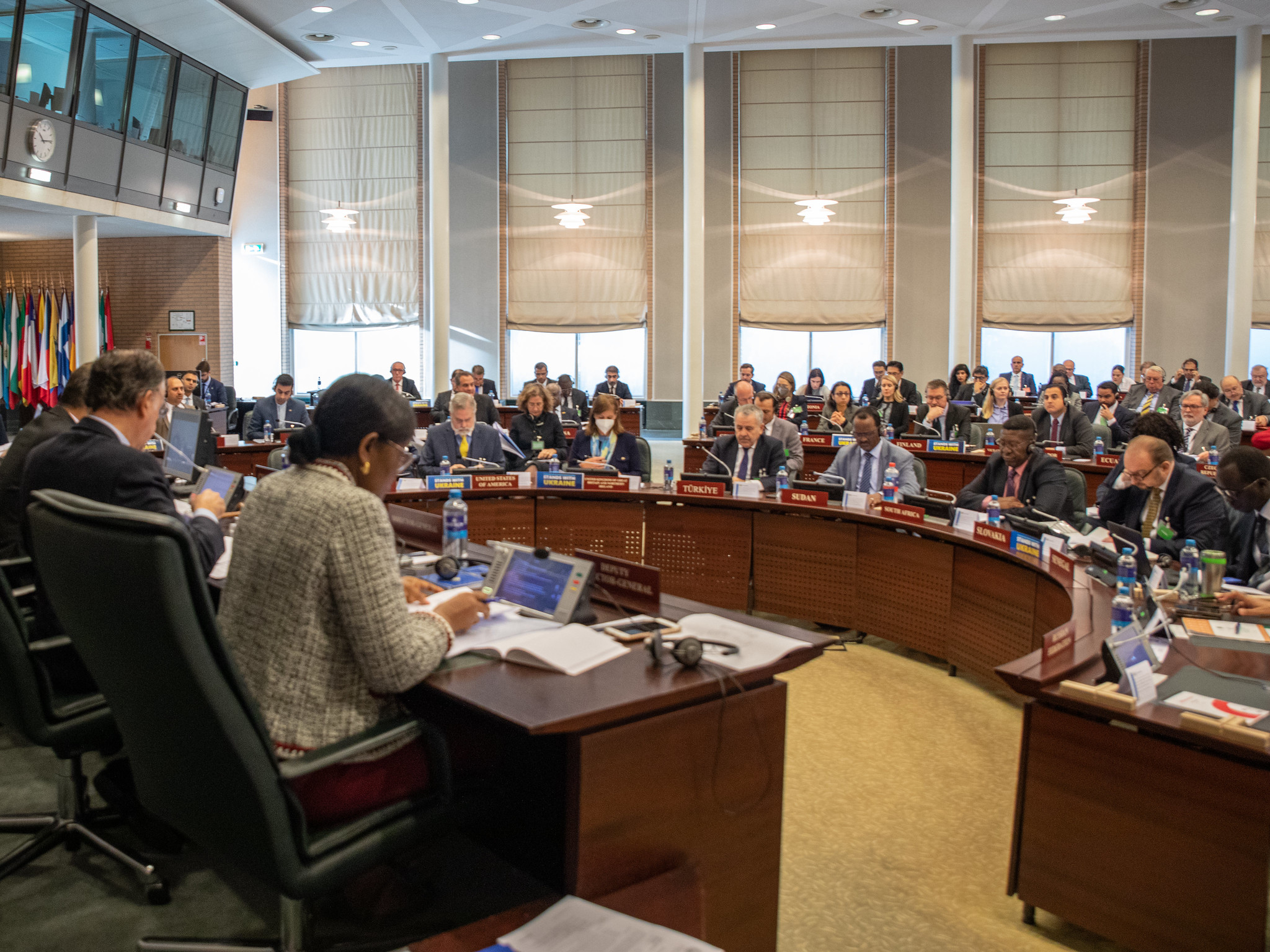Event and Conference Summaries
Summary Report
101st Executive Council Session
The 41-member Executive Council (EC) of the Organization for the Prohibition of Chemical Weapons (OPCW) convened in The Hague from October 4 to October 7, 2022, for the 101st Executive Council (EC-101) session. The Executive Council is responsible for promoting the effective implementation of and compliance with the Chemical Weapons Convention. The EC will typically meet 3 times annually with several additional special sessions. The Chairperson for EC-101 was H.E. Ambassador Ziad M.D. Al Atiyah of Saudi Arabia.
This summary report will cover:
- Descriptions and key quotes of the major thematic topics discussed within the national statements of Council member states
- Focus areas for the Fifth Review Conference (May 2023)
- Items of note, including: joint statements, notes verbales, reports by the Director-General
Need a refresher on the OPCW, CWC, or Executive Council? Check out these short educational videos produced by the OPCW.
Major Themes and Key Quotes
Addressing Disinformation
Since Russia invaded Ukraine in February 2022, there have been numerous allegations regarding chemical weapons use, false flag preparations, and chemical facility targeting. The OPCW is maintaining a public record of correspondence of all accusations and counter-accusations. During EC-101, many member states called on Russia to cease disinformation efforts aimed at Ukraine and other states parties.
“Moreover, as part of its aggression against Ukraine, Russia has engaged in a campaign of disinformation and state-controlled propaganda in spreading unsubstantiated and unfounded allegations against Ukraine and others regarding chemical weapons while risking exposure of the Ukrainian population to toxic chemicals through their deliberate attacks against civilian industrial facilities. Let us recall that Russia, the country responsible for the ongoing war and violations of international law and international humanitarian law in Ukraine, has a track record in the use of chemical weapons in assassinations and assassination attempts as well as in sowing disinformation.” – Statement on behalf of the European Union, H.E. Ambassador Kateřina Sequensová, Czech Republic
The Budget
In the face of inflation and global instability, many nations noted the need for the OPCW to take every measure to keep costs low and to use money effectively. Several nations urged fellow states parties to continue to pay their annual contribution in full and on time. The EC voted to recommend a draft program and budget for consideration at CSP-27.
The decision recommends that the states parties appropriate “a total expenditure for 2023 of EUR 75,988,858, of which EUR 31,447,859 is for Chapter I related to verification costs; EUR 42,296,765 is for Chapter II related to administrative and other costs; EUR 800,020 is for the special fund for cybersecurity, business continuity, and physical infrastructure security; EUR 714,214 is for the Major Capital Investment Fund; EUR 350,000 is for the special fund for OPCW Equipment Store; and EUR 380,000 is for the special fund for OPCW designated laboratories and laboratory equipment.” – Decision: Draft Revised Programme and Budget of the OPCW for 2023
Tenure Policy
The states parties recommended a decision for consideration during CSP-27 that would temporarily change the rules associated with rehiring of inspectors. The decision noted that COVID-19 prevented many of the routine inspection activities of the OPCW Inspectorate, thus depriving many new inspectors the opportuntiy to “gain adequate experience that would have enabled them to be promoted in sufficient numbers to meet the prospective operational requirements of the Inspectorate Division.” Twenty-one Inspection Team Leaders will reach their tenure in 2023, which will “result in an unexpected deficit of experienced inspectors in the coming years (2023 and 2024).” Normally, OPCW employees can work no longer than 7 years at the organization. This decision recommends, among other items, that at the 27th Conference of States Parties, states should approve the decision that the Director-General may continue to rehire individuals who have previously been designated OPCW inspectors. The decision stipulates that the rehiring mechanism must be used sparingly, and that no more than 20% of the inspectors in the Secretariat at any given time can consist of rehired inspectors. It also specifies that the implementation of this decision should be reviewed at the 29th Conference of the States Parties.
“The European Union has noted with great concern the information provided by Director General Arias that the Technical Secretariat will face a high turnover in the Inspectorate Division in 2023 which will affect its operational capacity. The situation underlines the urgent need for amending the OPCW Tenure Policy in the context of the Fifth Review Conference with a view to improving the Technical Secretariat’s ability to maintain key expertise required to ensure the continued implementation of the Convention. As an interim measure, a new Decision on rehiring of inspectors is warranted.” – Statement on behalf of the European Union, H.E. Ambassador Kateřina Sequensová, Czech Republic
The ChemTech Centre
Construction of the Centre for Chemistry and Technology (ChemTech Centre) began October 2021 and is scheduled to be completed before May 2023. The new facility aims to help the OPCW keep pace with current threats, conduct research to support verification methods, enhance the Technical Secretariat’s ability to provide training activities, test and deploy equipment, and act as a knowledge repository.
“Algeria looks forward to the 2023 completion of the Centre for Chemistry and Technology (ChemTech Centre), considering its essential role for Convention implementation, particularly in terms of capacity building and technical support to be provided to developing countries, especially in Africa.” – H.E. Amb. Salima Abdelhak, Algeria
Russia
During EC-98, forty-five member states produced a joint statement that called on Russia to cooperate fully with the OPCW in a thorough and transparent investigation of the poisoning of Alexei Navalny, which took place in August 2020. Multiple laboratories have identified the substance used in the assassination attempt as a military nerve agent belonging to the Novichok group. The enquiring states have been consistently dissatisfied with Russia’s answers, and continue to call for Russia to cooperate with the OPCW to investigate the incident.
“We recall that the assassination attempt of Mr Alexei Navalny on Russian soil in August 2020 is still not resolved. As confirmed by the OPCW designated laboratories in Germany, Sweden, France and the OPCW itself, there is no doubt that Mr Navalny was poisoned by military-grade nerve agent of Novichok group which was developed by the Russian Federation. We do condemn the Russian Federation in the strongest possible terms on this issue and we urge Russia to change its disruptive and noncooperative approach, so the OPCW can shed light on the assassination attempt of Mr Navalny.” – H.E. Ambassador Juraj Macháč, Slovakia
US Stockpile Elimination
Under its treaty obligations, the United States must finish destroying its chemical weapons stockpile by September 2023. Out of the 8 member states that declared chemical weapons stockpiles, the United States is the last to finish stockpile destruction.
“The United States also continues to make steady, measurable progress towards the complete destruction of its declared chemical weapons stockpile. We remain on track to meet our planned completion date. Over 98.27% of our declared stockpile has now been verifiably destroyed under the watchful eyes of OPCW inspectors.” – H.E. Joseph Manso, United States of America
Industry Inspections
Industry inspections play a vital role in preventing the diversion of peaceful applications of chemistry for nefarious purposes. As of 30 September 2022, 4,922 industrial facilities across the globe are subject to inspection by the OPCW. Public health measures enacted in response to COVID-19, such as travel restrictions, have impacted the ability of the OPCW to carry out industry inspections. However, several nations encouraged member states to make an effort to resume industry inspections.
“Despite the challenges posed by the pandemic, India has actively cooperated with the OPCW for inspections of its declared industrial facilities. In light of emerging challenges and scientific advancements, India believes that OPCW needs to evolve a more transparent, equitable and objective criteria and modalities for the inspections.” – Statement by H.E. Ambassador Reenat Sandhu, India
“Mr. Chairperson, the United States is happy to share that thanks to the availability of vaccines, the improved public health situation, and the associated lifting of travel restrictions, we have been able to host ten Article VI industry inspections so far in 2022. The United States expects to be able to accommodate a full schedule of inspections during 2023. We urge all States Parties that have not done so already to take all necessary measures to allow the OPCW to fully carry out its verification mandate.” – Statement by H.E. Ambassador Joseph Manso, United States of America
Abandoned Chemical Weapons
Japan has an obligation as an Abandoning State to complete the destruction of abandoned chemical weapons left on Chinese territory. Japan was originally set to complete destruction activities by the end of 2022, but delays caused by COVID-19 have severely impacted the projected timeline.
“At this session, the council will consider the draft decision on the extension once again of the destruction deadline. China is deeply concerned about Japan’s failure to complete the destruction by the deadline specified in the Convention and the council’s relevant decision, and strongly urges Japantoincrease its personnel, technology and financial inputs, make every effort to ensure that the destruction is completed by 2027 pursuant to the new decision, and solve the problem of the contaminated soil as soon as possible in a responsible way.” – H.E. Tan Jian, People’s Republic of China
NGO Participation
NGOs and civil society play an important role in supporting the full universalization of the CWC through their research, advocacy, and outreach. NGO participation in the annual Conference of the States Parties to the CWC has been impacted by the ongoing global pandemic. Despite restrictions on in-person participation, NGOs should still remain involved with the CSP and have opportunities to share NGO statements and relevant research.
“Finally, the Netherlands wants to stress the importance of engaging civil society in our common goal to uphold the global norm against the use of chemical weapons. We support and encourage the widest possible participation of representatives of non-governmental organizations at the upcoming Conference of the States Parties as well as at the Review Conference in 2023.” – H.E. Ambassador Henk Cor Van Der Kwast, The Netherlands
RC-5 Focus Areas
“The Republic of Albania is also concerned about the Director-General’s prediction that a high turnover in the Technical Secretariat’s Inspectorate Division in 2023 would harm its operational capabilities. The scenario highlights the urgent need to alter the OPCW tenure policy at the Fifth Review Conference to improve the Technical Secretariat’s capacity to keep vital expertise for Convention implementation. As a stopgap, rehiring inspectors should be guaranteed to ensure the continuation of quality work this Organisation is endowed to.”
“States Parties should take the Fifth Review Conference as an opportunity, proceed from the purposes of maintaining the authority of the Convention, foster the unity of the OPCW and promote the realization of “a world free of chemical weapons”. States Parties should review the achievements, and formulate a pragmatic and effective strategy for the next stage of the OPCW, making new contributions to the international arms control and disarmament process. China expects the OEWG to play a constructive role in bridging differences, promoter consensus among States Parties, and yield positive results for the Fifth ReviewConference. China is committed to engaging in the preparation of the FifthReviewConference, and working with all the other parties in upholding the shared, comprehensive and cooperative and sustainable security vision, practicing the true multilateralism and continuously enhancing the universality, authority and effectiveness of the Convention.”
“Canada is pleased by the progress made in preparing for the Fifth Review Conference. We are preparing our paper about gender equality, which we hope will contribute to increasing diversity and inclusion in the Technical Secretariat. Early consultations indicate the Technical Secretariat has already laid the foundation for success in advancing gender equality and diversity, particularly in human resources and assistance and protection.”
“The full, effective, and non-discriminatory implementation of all the provisions of Article XI is imperative. The related training, technology transfer, and equipment exchange programmes are vital for meeting one of the central objectives of the Convention. Likewise, it should guarantee the absence of any obstacles hindering the economic and technological development of the States Parties, while promoting international cooperation in the field of chemical activities for purposes not prohibited by the Convention—one of its basic pillars. We hope that this will be a central topic of discussion at the Fifth Review Conference and that we will be able to make progress in developing a concrete action plan that will help strengthen this activity.”
“Just like other countries in the Latin American and Caribbean region, El Salvador is in favour of balanced geographical representation across the Technical Secretariat. To this end, it is necessary to strengthen the knowledge and candidates of the region to ensure that they have the requisite qualifications. As such, this issue is of particular importance for El Salvador during the Fifth Review Conference.”
“The Fifth Review Conference will be an opportunity to consider how to strenghten implementation of the Convention as a key instrument of the international nonproliferation and disarmament regime. Achieving a common vision on countering the reemergence of chemical weapons and safeguarding the global non-use norm is a shared responsibility of all States Parties.”
“The Fifth Review Conference, in May 2023, will be an opportunity for all States Parties to formulate a common vision to counter re-emergence of chemical weapons and reaffirm the global non-use norm of chemical weapons. We are encouraged by the preparatory process so far and hope to see continued, active engagement of States Parties moving forward.”
“The most recent confirmed uses of chemical weapons on a small scale in particular underscore the need for the Organisation to maintain a robust verification regime. We therefore welcome the initial discussions in the context of the Open-Ended Working Group (OEWG) in Preparation for the Fifth Review Conference under the able leadership of the Ambassador of Estonia. The first sessions on verification and international cooperation and assistance have shown the relevance of the Convention, as well as the need to ensure that the Convention and the OPCW remain fit for purpose, both in light of scientific and technological developments and in light of continuing challenges to the global ban on chemical weapons. Moreover, the OEWG’s discussions have yet again confirmed that international cooperation and assistance is an integral part of the Organisation’s efforts to achieve full compliance with the Convention by all States Parties. In addition, considerable developments in the chemical industry necessitate an overall reform of the industry verification regime. Germany is confident that further discussions on these matters within the OEWG will lead to a meaningful outcome for the Fifth Review Conference.”
“Latvia agrees that upcoming the 5th CWC Review Conference will be an appropriate occasion to consider ways how to strengthen international norms prohibiting chemical weapons. Latvia supports efforts by the Chairperson, Ambassador Lauri Kuusing of Estonia to steering the work of the Open-Ended Working Group towards gathering multiple views with a goal of building consensus.”
“My delegation is aware that the threat of use of chemical agents as weapons by non-State actors constitutes a serious danger to the security of the States Parties, and therefore commends the work done within the framework of the Open-Ended Working Group on Terrorism, chaired by H.E. Ambassador Vusimuzi Madonsela, the Permanent Representative of South Africa.
The latest meeting of this Group was an opportunity to gather the views of the States Parties in regard to the scourge of chemical terrorism and the risk of the re-emergence of chemical weapons; these should be reflected in the preparatory process for the Fifth Review Conference scheduled for 2023.”
“Poland is very interested in a tangible outcome of the Review Conference, which should take stock of the implementation of the Convention and offer guidance for further strengthening it in the future. We also see merit in including the topic of sea-dumped chemical weapons in the 3 related discussions.”
“The Fifth Review Conference next May will provide a valuable opportunity to enhance the readiness of the OPCW as a whole in key areas from verification and international cooperation to capacity-building.”
“Next year will be an extremely important one: the Fifth Review Conference will take place. It will be an opportunity to consider how to ensure the continued relevance of the Convention as a key instrument of the international non-proliferation and disarmament regime. It will also be an opportunity to pay attention from the perspective of a common vision on countering the reemergence of chemical weapons and safeguarding the global non-use norm. In this context, we cannot forget the importance of the operationalization of the Centre for Chemistry and Technology – the ChemTech Centre, which will significantly enhance the capabilities and status of the OPCW as a global leader in the effort to rid the world of chemical weapons. Romania financially supported the existence of this centre and will continue to be involved in this initiative.”
“The Fifth Review Conference, to be held in 2023, will be critical in reaching a common understanding to address the challenges facing the Convention and to keep the Organisation fit for purpose.”
“The United States would also like to commend the Estonian Chair of the Open-Ended Working Group for the Preparation of the Fifth Review Conference for the successful discussions on verification-related issues and enhancing International Cooperation and Assistance. States Parties discussed many useful ideas for improving the verification regime and for using International Cooperation and Assistance programs to build capacity and promote full implementation of the Convention. We believe that it is crucial that the Review Conference address forward-looking ideas in these areas to ensure that the OPCW remains fit for purpose. We also commend the South African Chair of the Open-Ended Working Group on Terrorism for his efforts to address the emerging threat of CW use by non-state actors, and we hope the Review Conference will highlight this topic.”
Items of Note
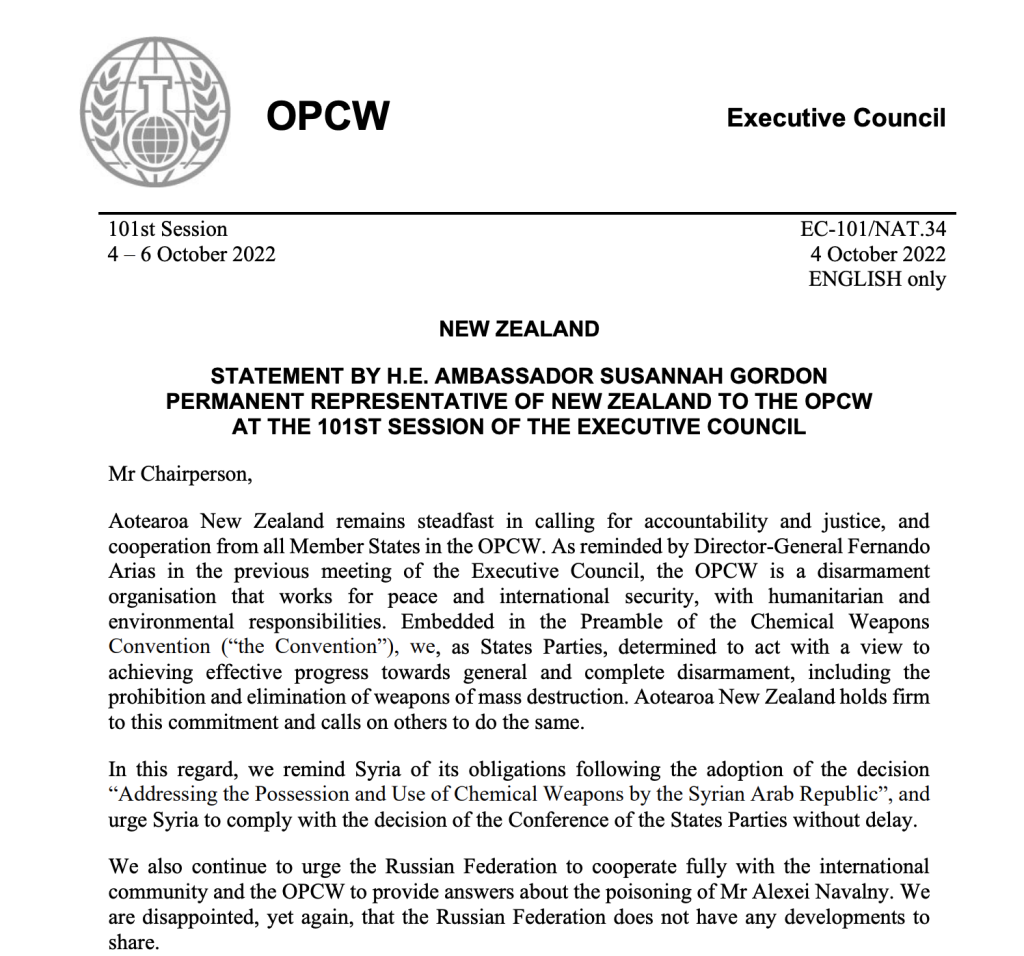
01. National Implementation
New Zealand mentioned that it welcomed the efforts of the Governments of Australia and Malaysia to host a subregional forum on national implementation of the Chemical Weapons Convention for Pacific Island States. The statement noted that “Aotearoa New Zealand considers ourselves one and of the Pacific, and having an opportunity to engage with, and learn from, our colleagues in the region is incredibly valuable.”
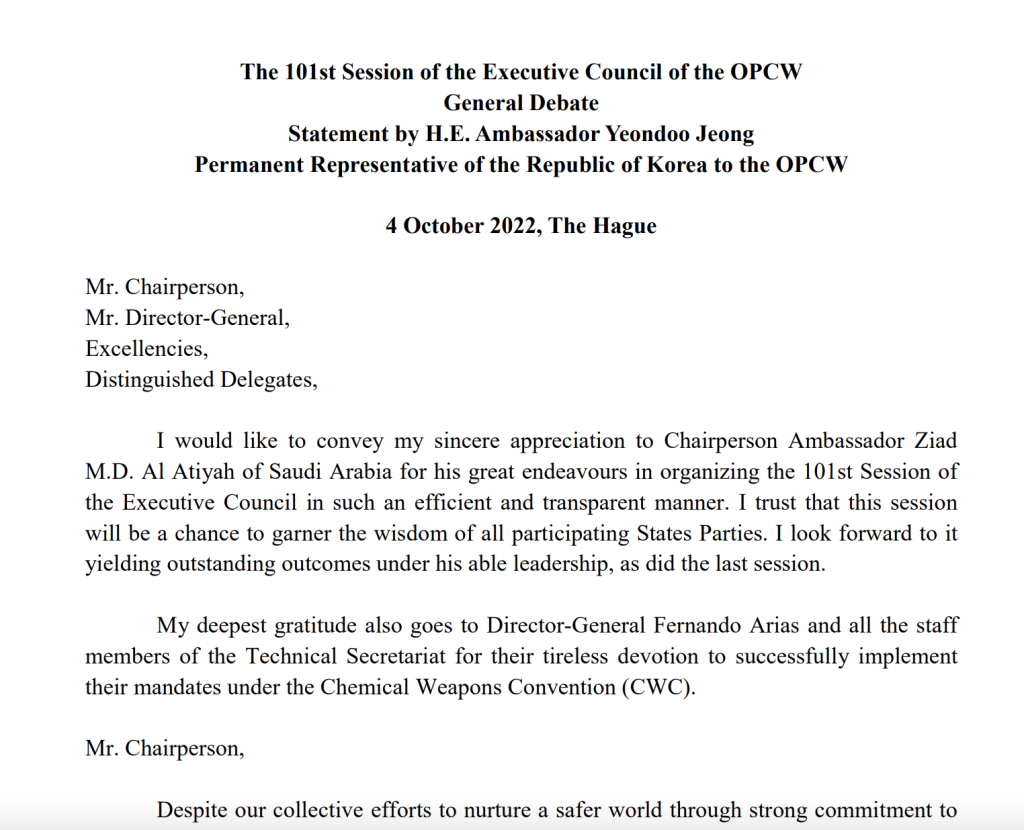
02. Knowledge Sharing
In its national statement, the Republic of Korea mentioned that it would be hosting the 10th Seoul Workshop in November in-person. The goal of the workshop is to share best practices and to enhance chemical safety and security management of Asian States Parties. The Republic of Korea noted that “as threats emanating from advances in chemical technology are evolving, there is a need for more international collaboration to build capacity in the field of chemical safety and security.”
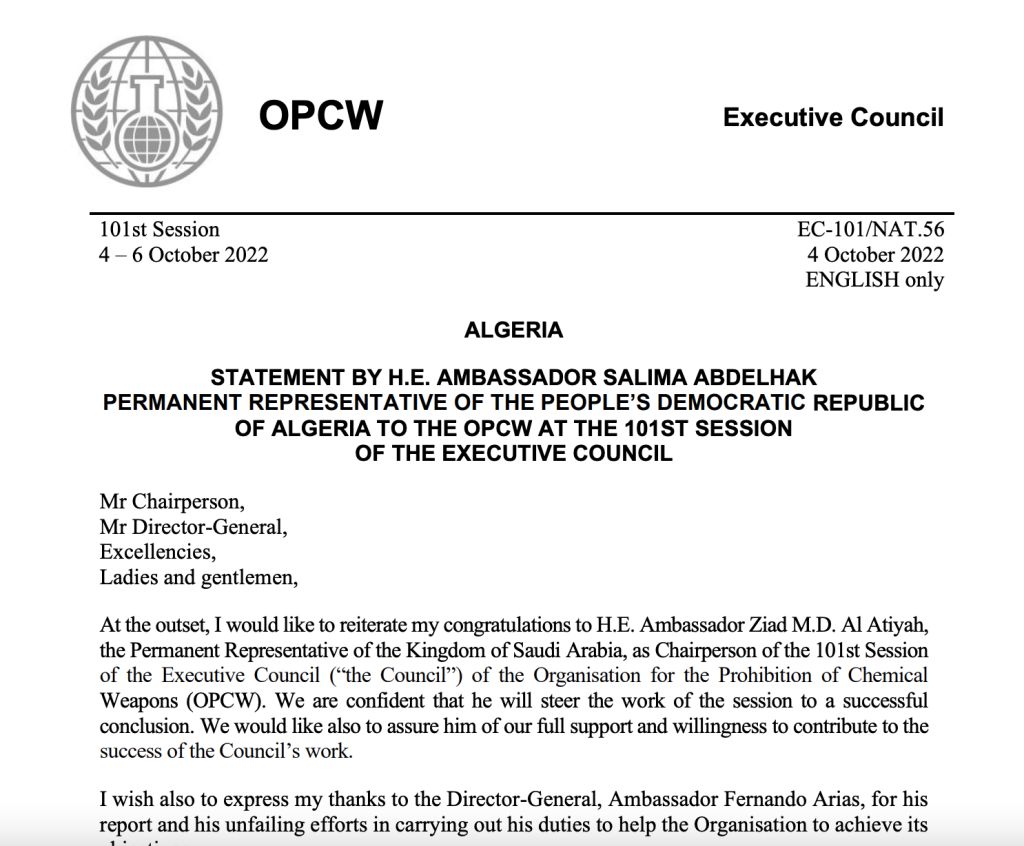
03. Centres of Exellence
In a statement, the delegation of Algeria expressed its approval of an OPCW initiative to create regional centres of excellence on the African continent. The delegation noted that such an initiative would be likely to contribute to strengthening cooperation between African countries and improving the performance of their national entities. The Algerian delegation reiterated the interest of Algeria in hosting the centre for the North Africa and Sahel region.
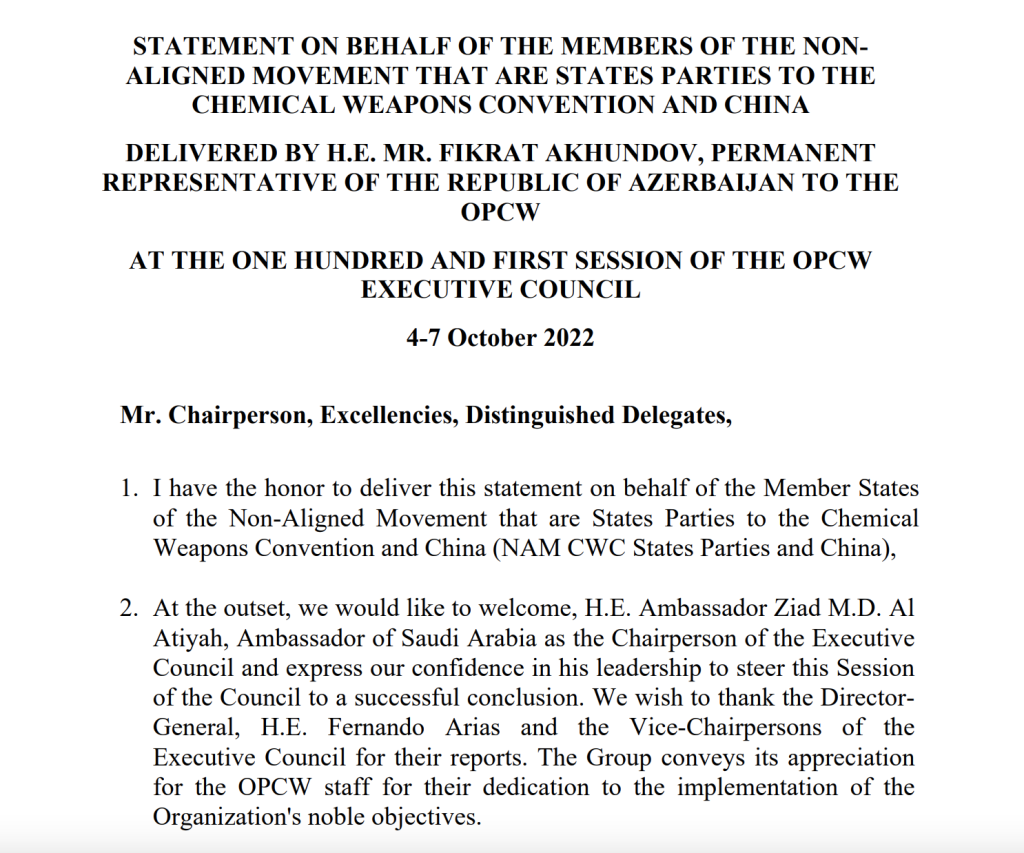
04. Junior Professional Officer Programme
In a statement delivered on behalf of the Member States of the Non-Aligned Movement that are States Parties to the CWC and China, the group called upon the Secretariat “to devise as soon as possible appropriate modalities of a funded internship and Junior Professional Officer Programme.” The group also noted that such a program, would enable candidates from developing States Parties, to have equitable access to professional positions in the Technical Secretariat.
